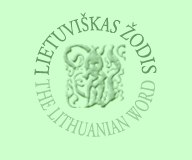- PROPERLY:
- JUOZAS TUMAS-VAIZGANTAS, (1869-1933),
Roman Catholic priest, journalist, activist, and writer, born in
Maleisiai, county of Rokiskis, on Sept. 8, 1869. The youngest son of a
patriarchal family, he grew up along with one brother and three
sisters. From his family and the natural environment of his birthplace
he drew a rich
linguistic ethnologic inheritance, a sense of creative independence, a
feeling for the concrete, a mystical intimacy with God and earth, and
a love for his fellow man. While a student at a Daugavpils secondary
school in Russian-ruled Latvia, he read the Russian classics, which
fostered his literary interest, and clandestine Lithuanian
publications (forbidden by the Press Ban), which nourished his
patriotism. Upon admission to the
Kaunas Theological Seminary (1888), his sanguine and impulsive
temperament was bent to the demands of duty and hard, sustained work.
These influences combined to produce a dynamic yet morally noble
character faithful to both his priestly calling
and his civic vocation as a defender of the Lithuanian cause against
Russian civil and Polish ecclesiastical authorities.
- Ordained priest in 1893, he was
constantly being transferred from one parish to another because of his
patriotic activities; during eleven years he served in seven parishes.
From 1896-1902 he edited the monthly Tevynes Sargas (Guardian
of the Homeland), which was printed in East Prussia and secretly
carried across the border.
When his brother was sentenced to a 5-year term in Siberia for
distributing this publication, Tumas-Vaizgantas himself was advised to
flee to America. Instead, he listened to his friend, Rev. Aleksandras
Dambrauskas, and remained in Lithuania. In 1900 he introduced and
edited a supplement to Tevynes Sargas, the quarterly cultural
journal Zinycia (Reference Book), for which he was formally
accused of being a "Lithuanian maniac." Whilethe diocesan
ecclesiastical court exonerated him, he was forbidden to publish
anything without the bishop's permission. This time the poet Maironis
talked him out of abandoning the diocese of Samogitia in favor of Riga
or St. Petersburg.
- During the Revolt of 1905, the Great
Assembly of Vilnius met to demand autonomy for Lithuania.
Tumas-Vaizgantas participated as a Christian Democrat, and on
returning
to his parish began putting into effect the assembly's resolutions
directed
against the local Russian administration. This cost him two quick
transfers in succession. In 1907, three years after the repeal of the
Press Ban, he joined the editorial board of the newly founded journal Viltis
(Hope), which was published three times a week in Vilnius. The task of
editing the journal brought him into close contact
with Antanas Smetona, Liudas Noreika, and Juozas Kubilius, who later
founded the Nationalist Union. He came to feel more at home in the
latter than in the Christian Democratic movement, whose program he had
helped conceive. In the meantime, the Polonized diocesan chancery of
Vilnius, offended by his pro-Lithuanian activism, compelled his
transfer to Kaunas.
- In 1911 he visited the Unitea States to
collect funds for the construction of facilities to house the
headquarters of the Saul6 (Sun) Educational Society. On his
return three months later he wrote his impressions, Ten gera, kur
musu nera (The Grass Is Always
Greener on the Other Side, 1912), urging people not to leave their
homeland in search of an easier life abroad. At the onset of World War
I (1914), he went to Latvia to edit the newspaper Rygos Garsas
(Sound of Riga). In 1915 he was invited to work with the Lithuanian
Central Relief Committee in Petrograd. During the Lithuanian
Conference convened in that city in 1917, he wholeheartedly supported
the resolution demanding Lithuanian independence. Shortly thereafter
he attended another Lithuanian conference in Stockholm. From Sweden he
returned to Lithuania and served on the relief committee in Vilnius
before moving to Kaunas in 1920. There he edited the journals Tauta
(Nation), Musu senove (Our Antiquity), and Trimitas
(The Bugle), and
participated in the work ol a dozen societies and organizations. From
1922-1929 he taught Lithuanian literature at the University of Kaunas;
from 1920 -1932 he was rector of the church of the Assumption of the
Blessed Virgin Mary (popularly known as the church of Vytautas). By
his originality, good will, and undiscriminating helpfulness he earned
virtually universal respect among Lithuanians. His death in Kaunas on
April 29, 1933 was widely mourned.
-
- Literature:
ENCYCLOPEDIA LITUANICA I-VI, 1970-1978, Boston

